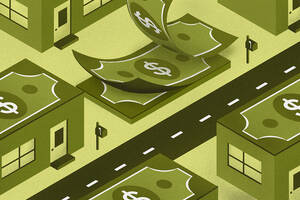Finance & Accounting Strategy Economics Policy Jul 1, 2009
Walking Away
Moral, social, and financial factors influence mortgage default decisions
The mortgage crisis that started in 2007 precipitated an unprecedented fall in the value of American housing. The number of households that owe more on their mortgages than the value of their homes has greatly increased; for some regions that figure exceeds 50 percent. Overall, more than 20 percent of households in the United States now have negative equity. This has led to a new phenomenon: strategic defaults. These occur when homeowners walk away from mortgages that exceed the value of their houses even when they can afford the monthly payments.
The likelihood of strategic defaults has a critical impact on government efforts to alleviate the problem of negative equity and its effect on the overall economy. Unfortunately, few tools exist for determining why and how often householders choose or refuse that option. The Obama administration has referenced a paper published last year in the Journal of Urban Economics by Christopher Foote and colleagues at the Federal Reserve Bank of Boston. During the 1990-1991 recession in Massachusetts, they found that very few people who could afford their mortgage payments walked away from their houses. However, only 6 percent of borrowers had negative equity at the time. Furthermore, the amount of negative equity did not exceed 10 percent. Today’s figures greatly exceed both numbers.
Now, a study co-authored by Paola Sapienza (Associate Professor of Finance at the Kellogg School of Management) provides valuable new insights for policymakers. Its conclusions: The pace of strategic defaults quickens as the amount of negative equity increases beyond 10 percent of a home’s value. But moral and social considerations play a crucial role in dissuading many householders from taking that route—at least until potential losses reach a certain threshold.
A Better Prediction
“We’re trying to formulate a better prediction at the high range of losses,” Sapienza explains. “We ask the question: If a homeowner has negative equity in his house and can still afford to pay, what is the probability he will walk away from the house? If the final answer is that strategic default is unlikely, then the right approach is to disregard this problem in designing policies. Alternately, if the answer to the question is that many homeowners are likely to walk away, then it is important for the Obama administration to seriously consider the social and economic consequences of this behavior.”
Walking away from an affordable mortgage with negative equity has certain disadvantages. In addition to losing a home customized to their tastes, departing householders incur relocation costs and suffer severe reductions in their credit ratings—making it difficult for them to borrow in the future. And most states allow mortgage holders to pursue strategic defaulters for the difference between the amount owed on the mortgage and the house’s resale value.
Despite those factors, Sapienza says, “It’s relatively easy to walk away in the United States.” However, she continues, “Economists wonder whether money is the only consideration.”
In collaboration with Luigi Guiso (Professor of Economics at the European University Institute) and Luigi Zingales (Professor of Entrepreneurship and Finance at the Booth School of Business, University of Chicago), Sapienza set out to quantify the impact of non-financial considerations on mortgage default decisions. “Individuals may have moral considerations that affect their willingness to default,” the team writes in a working paper. “Default can be perceived as morally wrong and, as such, something to avoid—if not at all costs—at some significant cost. Moral considerations, if widespread, may strongly mitigate the likelihood that American households will default on their mortgage, even if the value of housing continues to depreciate.”
Driving Strategic Defaults
To study the constraints on strategic mortgages, Sapienza formulated a survey to collect relevant information from 1,000 representative American households. Called the Chicago Booth—Kellogg School Financial Trust Index, it tracks changes in trust in the financial industry and its impact on investors’ decisions, with updates published quarterly. Conducted in December 2008 and March 2009, the survey included questions regarding strategic defaults: How likely are you to undertake a strategic default if your home’s value falls short of the mortgage loan you owe by various amounts? And, do you regard a strategic default as morally wrong? To guage the social pressures on homeowners, respondents were also asked how many people they knew who had defaulted on their houses and how many had defaulted strategically.
The survey reveals three main influences on the 26 percent of all defaults that, according to acquaintances, are strategic. Whereas only 5 percent of households would default strategically if they faced a shortfall between 10 and 20 percent of the value of their homes, the number rises to 17 percent for a shortfall of 50 percent. Even the 81 percent of respondents who think it morally wrong to default on a mortgage when one can afford to pay it can change their minds when their potential losses increase. In addition, the authors report, “The social pressure not to default is weakened when homeowners live in areas with high frequency of foreclosures or know other people who defaulted strategically.” Other things being equal, the researchers continue, “People who consider it immoral to default are 77 percent less likely to declare their intention to do so, while people who know someone who defaulted are 82 percent more likely to declare their intention to do so.”
“We confirm the Foote paper’s conclusion that below 10 percent negative equity people do not walk away, as it is too costly and there is a moral consideration—a shame factor,” Sapienza summarizes. “Our contribution is to show what may happen when the drop in value is greater than 10 percent. In areas where the ratio of foreclosures to total mortgages is more than 15 percent, people are more inclined to walk away. When negative equity is large enough, people declare that they would walk away from their mortgage. People who think it is immoral are still less inclined to do so, but from our survey we learned that when economic considerations are large enough they mitigate moral constraints.”
Policy Implications
What does the study imply for policymakers’ efforts to ease the mortgage crisis? “We don’t have a policy recommendation,” Sapienza says, “but we assert that the percentage of people who may decide to walk away because of the substantial collapse in house pricing is not trivial. It could affect additional people in the community. Previous studies did not reveal that problem.”
The research also reveals that localities need to fine-tune their responses to the crisis according to the extent of housing value loss. “It gives us better knowledge of what will happen in areas where prices have dropped by 40 percent, say, compared with areas in which the decrease in prices is not so high,” Sapienza points out.
Finally, the study contains a message for homeowners who have kept up their mortgage payments and who might resent the idea of government support for those who have not. “At some fundamental level I could be upset that the government comes in to help my neighbor with bailout money that comes from my taxes,” Sapienza says. “But I am more likely to accept government intervention if I realize that otherwise many of my neighbors might walk away, causing the value of my own house to decline further.”
Further reading:
Foote, Christopher L., Kristopher Gerardi and Paul S. Willen (2008). “Negative equity and foreclosure: Theory and evidence.” Journal of Urban Economics, 64(2): 234-245.
Wible, Brad (2009). “Measuring Trust. Introducing the Financial Trust Index (Based on the research of Paola Sapienza and Luigi Zingales)” Kellogg Insight, February.
Guiso, Luigi, Paola Sapienza, and Luigi Zingales. Forthcoming. “The Determinants of Attitudes Towards Strategic Default on Mortgages,” Journal of Finance.


